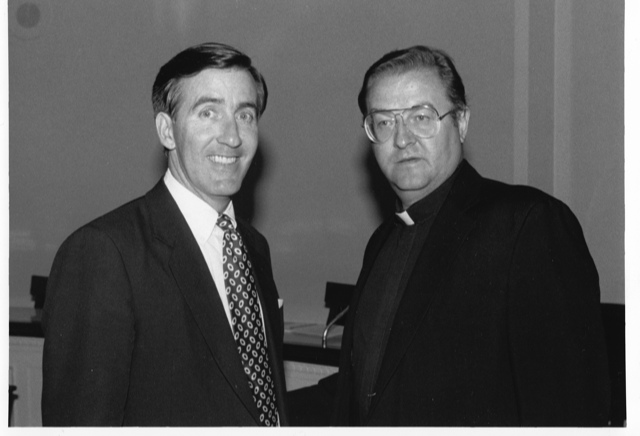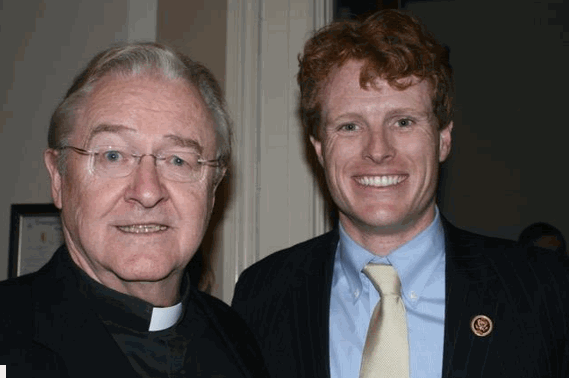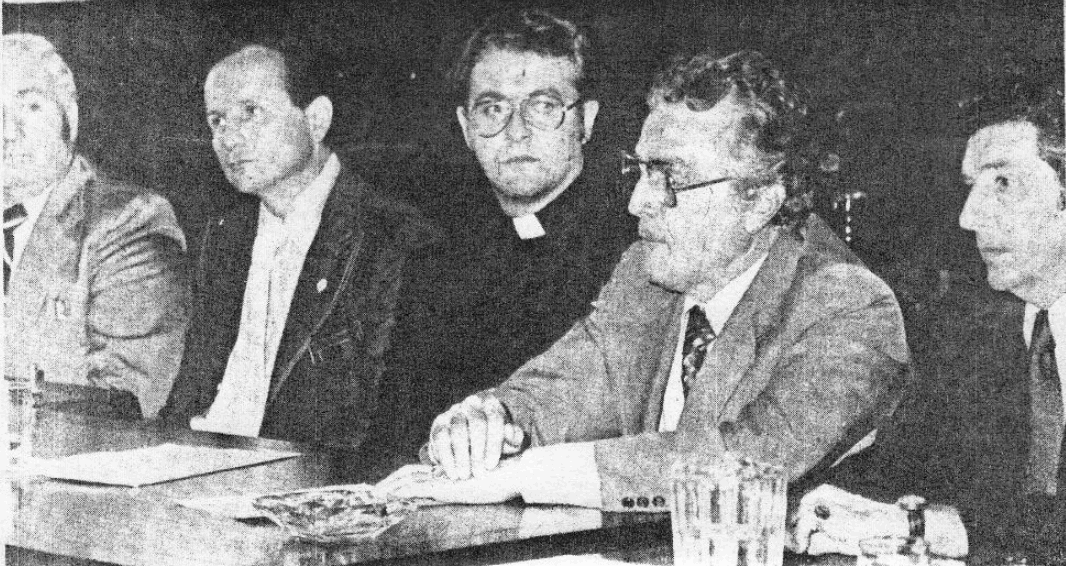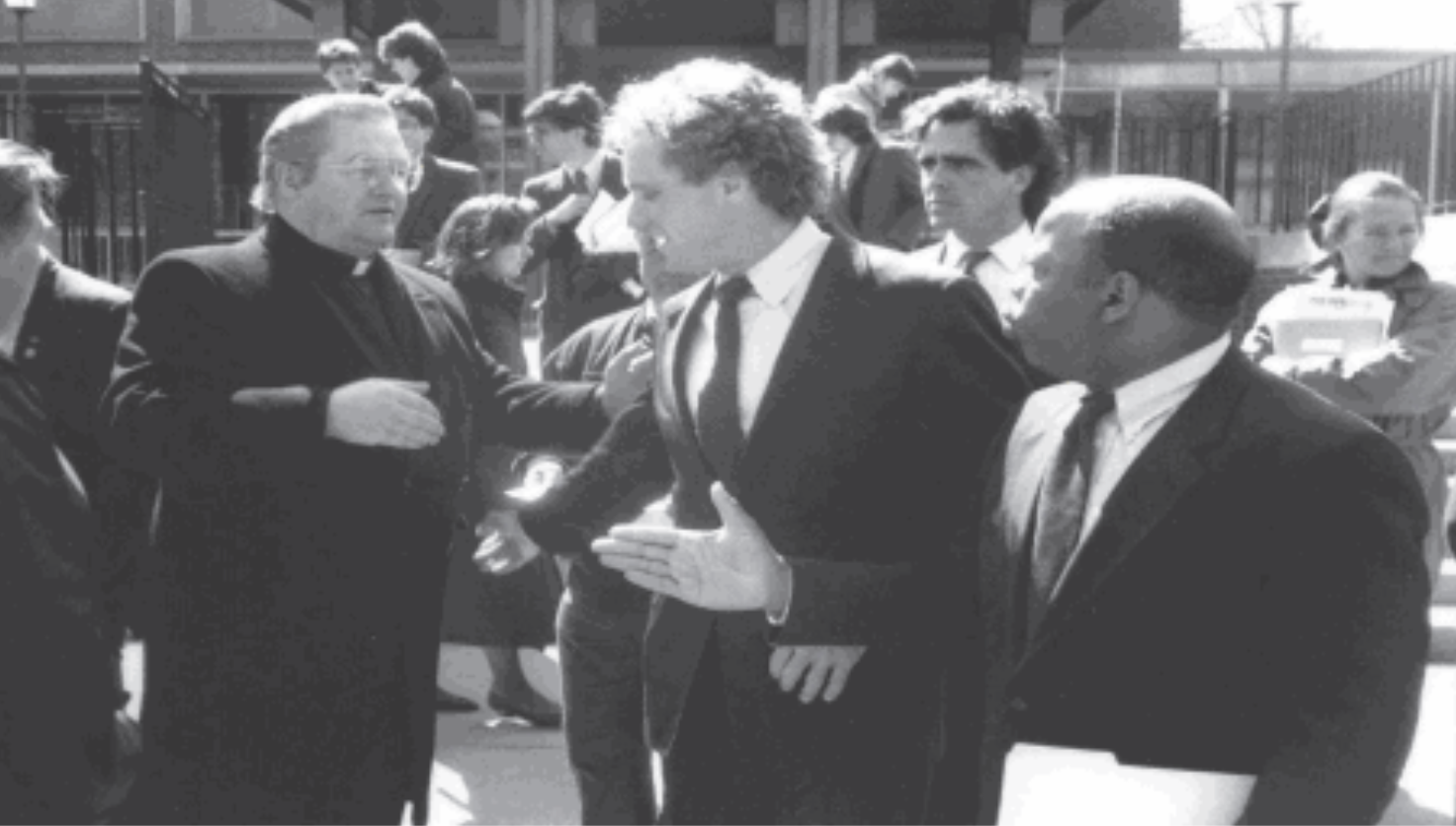Explanation of the historical origins of the formation of the Ad Hoc Congressional Committee for Irish Affairs, Friends of Ireland, and the Congressional Friends of Irish National Caucus
Posted By: March 09, 2021
Explanation of the historical origins of the formation of the Ad Hoc Congressional Committee for Irish Affairs, Friends of Ireland, and the Congressional Friends of Irish National Caucus—excerpt from Fr. Sean McManus’ Memoirs: My American Struggle for Justice in Northern Ireland (First Irish edition 2012; third U.S. edition 2019).
Available from Irish National Caucus.org for American readers. Available
on Amazon for overseas readers.
Fr. McManus Chairs launching of Ad Hoc Committee (l-r):Tom McNabb, Deputy National President, AOH; Congressman Edward P. Beard (D-RI); Congressman Mario Biaggi (D-NY); and Congressman Leo C. Zeferetti (D-NY). Washington, D.C., September 27, 1977.
Formation of Ad hoc Congressional Committee for Irish Affairs
Third U.S. Edition pages—150-152
But the Irish Embassy would have even more reason to be concerned by what The New York Times, in a front-page article, described was, up until that time, “the Caucus’ boldest success”—the formation of the Ad Hoc Congressional Committee for Irish Affairs.14
On Tuesday, September 27, 1977, I chaired the press conference on Capitol Hill at which we appointed Congressman Mario Biaggi (D-NY) as chairman: “Congressman Biaggi was selected by us,” Fr. McManus said, “because he has truly distinguished himself by his consistent and outspoken concern for my country. Although his ancestry is not from Cork, Kerry, or Fermanagh, the Congressman has shown more compassion than some Congressional leaders with Irish names. On behalf of the Irish National Caucus, the National President of the AOH, and all Irish-American organizations, it gives me great pleasure to appoint you, Congressman Biaggi, Chairman of the Ad Hoc Congressional Committee for Irish Affairs.”15
Then I announced the Committee’s threefold purpose: (1) To seek full Congressional Hearings on violations of human rights in Ireland; (2) to reverse the U.S. policy of refusing visas to Irish Republicans; and (3) to represent the views of Irish-Americans to the President of the US.
The one acid test that I had given Mario before we asked him to chair the Committee was, “Are you prepared to stand up to the Dublin government?”
Mario had responded, “Absolutely.”
Is it not pathetic that we had to have this concern? Is it not shameful that this highly decorated police hero, and proud son of Italy, had to not only take on the British government but to watch his back with the Irish government as well? But that’s the way it was. One could see Dublin’s real policy towards the North far more clearly in America than it could be seen in Ireland.
Mario (October 26, 1917—June 25, 2015) deserves huge credit and must never be forgotten by Irish-Americans who are dedicated to justice and peace. He was a truly great man; God rest his soul.
The Irish Embassy had been telling Members of Congress that Congress had no role to play in Northern Ireland—that it should be left to the British and Irish governments and to diplomats. In a very short time, we had signed up over one hundred Members—Republicans, Democrats, Liberals, Conservatives, Protestants, Jews, Catholics, etc.
On September 28, the Religious News Service filed a report: “In an interview [after the press conference] … Father McManus said, ‘We are disappointed with Sen. Edward Kennedy (D-MA) and Rep. Thomas P. O’Neill, Jr. (D-MA)—the most powerful politicians in the United States, and both Roman Catholics. They condemn violence in Northern Ireland but do not condemn British violence and torture … The American Catholic hierarchy has made several comments about violence in South Africa, Rhodesia and Chile, and quite rightly so. But they are silent about British violence in Ireland—with only one honorable exception, Bishop Thomas J. Drury of Corpus Christi, Texas.’16
Over the years certain elements would try to deny the Caucus’ pivotal role in forming the Ad Hoc Committee. However, the intrepid Tom McNabb, who was actually present (as the photo in this book shows) when I chaired the launching of the Committee, would set the record straight. As National Editor of The Hibernian Digest Tom declared in an Editorial: “It was through the Irish National Caucus that the important Ad Hoc Congressional Committee for Irish Affairs came into existence within the National Congress.”17
Friends of Ireland
Third U.S. Edition pages—221-222

Congressman Richie Neal (D-MA) and Fr. McManus. 1989.
What could the Irish Embassy do to save face, and also take the heat off the British that we were so very effectively applying? … Drum roll, please … Enter the Friends of Ireland! Yes, indeed, the Irish National Caucus not only initiated the Ad Hoc Congressional Committee for Irish Affairs—the Friends of Ireland also came into existence as a direct reaction to our forming the Ad Hoc Committee.
The Friends of Ireland was launched on Saint Patrick’s Day, 1981 by Tip O’Neill, Teddy Kennedy, Senator Patrick Moynihan, etc. As my good friend Congressman Gilman told me at the time, “It was a place for Tip to hang his hat.” Desmond Rush would write in The Irish Independent that Speaker O’Neill’s office had told him that its purpose was to put the Ad Hoc Committee out of business, and it would happen in six weeks.
“That’s what Jack Lynch thought,” I told Rush. I then called Kirk O’Donnell, one of O’Neill’s top people. O’Donnell would not deny Rush’s story. Former British MP, Kevin McNamara, in his book, The MacBride Principles: Irish-America Strikes Back (more of that later), says: “The Ad Hoc Congressional Committee was proving so successful that the SDLP supporters … encouraged by the Irish Embassy established the Friends of Ireland … The Embassy was alarmed by the activities and influence of the Ad Hoc Committee on the Hill and its closeness to the INC.”7 And even more tellingly, Mc Namara goes on to say that Werner Brandt, a key aide to future Speaker Tom Foley, would later authoritatively state that “The Friends of Ireland was formed to prevent Northern Ireland becoming ‘an irritant’ in Anglo-Irish-U.S. relations.”8 And there you have it, folks: the less than noble origins of the Friends of Ireland. However, I was careful not to condemn them, feeling that in time they could do good. Our aim was to have a strong Irish presence on Capitol Hill. And now there were two Congressional committees, where a short time ago there was none.
Congressmen Mario Biaggi, Ben Gilman, and Hamilton Fish asked me to come over to meet with them regarding the formation of the Friends of Ireland. I urged them to immediately join and told them we would be urging all members of the Ad Hoc Congressional Committee to join. I knew that although Tip and Teddy would toe the safe Dublin line, there was no way large numbers of Congressmen would be content with a “do nothing” policy. They were being pressured by their constituents to speak out against British violations of human rights, and there would be no use in their just saying “We can’t do anything, but Tip and Teddy are engaging in private diplomacy with the Dublin government.” That was no platform to run on. So many of them became just as outspoken as the members of the Ad Hoc Congressional Committee.
In time, our strategy would bear great fruit. When the Democrats lost power, and the Republicans took over in 1995, Congressman Jimmy Walsh from Syracuse, NY, took over as chairman of the Friends of Ireland. He was an ardent Fenian, a good friend, and a strong member of the Ad Hoc Congressional Committee. He would go on, in effect, to merge the two Committees together—making the Friends of Ireland just as strong on the issue. (And by this time, the Irish Embassy had eased off from trying to demonize me.) When the Democrats came back into power in 2007, Congressman Ritchie Neal (D-MA) became the chairman—a most dedicated Irishman who had long been a member of the Ad Hoc Congressional Committee, and whom we listed on our letterhead as a Congressional Friend, as we did Congressman Walsh until he retired from Congress in 2009. And in 2019, Congressman Neal became Chairman again.
Congressional Friends of Irish National Caucus
Third U.S. Edition—pages 222-223
 Fermanagh born Fr. Sean McManus and Fermanagh descendant Congressman Joe Kennedy III (D-MA)
Fermanagh born Fr. Sean McManus and Fermanagh descendant Congressman Joe Kennedy III (D-MA)
I should explain here that in 1982, we began the practice of listing on our letterhead the names of the senators and representatives who had become “Friends of the Irish National Caucus”—those who sent us a signed written statement confirming their support of our “nonviolent work for justice and peace in Ireland.” The list had to be updated every two years because of the elections for the House of Representatives. And the list got so long that we had to put the names on both the front and the back of our stationery. Democrats, Republicans, Conservatives, and Liberals wanted their names to be proudly displayed—from Congressman Barney Frank (D-MA), commonly seen as the most liberal, to Senator Strom Thurmond (R-SC), commonly seen as the most conservative (which made the Irish Embassy look a bit daft in trying to brand us as radical revolutionaries with old Strom on board!)
Since 1982, we have had scores and scores of Members of Congress, House and Senate, sign up as Congressional Friends of the Irish National Caucus. Now, in 2019, some of them have become Chairs of key House Committees. For example, Eliot L. Engel (D-NY) is the Chairman of the Committee on Foreign Affairs; Nita M. Lowey (D- NY) is the Chairwoman of Committee on Appropriations; Richard E. Neal (D-MA) is the Chairman of Ways and Means Committee; Jerrold Nadler (D-NY) is the Chairman of the Committee on The Judiciary; Elijah E. Cummings (D-MD) is the Chairman of the Committee on Oversight and Reform, and Alcee L. Hastings(D-FL) is the Chairman of the Commission on Security and Cooperation in Europe (U.S. Helsinki Commission); Jim McGovern (D–MA) is the Chairman of the House Rules Committee, and Ted Deutch (D–FL) is the Chairman of the House Ethics Committee.
I should add a note of interest here about the development of the Friends of Ireland. Congressman Brian Donnelly (1979–1993) was elected with the help of many of our supporters in Boston and pledged to them that I would be one of the first people he would meet with when he came to Washington. He kept his promise. I went to see him in his office, and the very first words out of his mouth were, “Father, I want to be briefed by you before I hear the bullshit from the Irish Embassy”— exactly his words. Brian would go on to attend our functions in Boston. He would, however, become a protégé of the future Speaker Foley, and one of the first chairmen of the Friends of Ireland. He always remained friendly and did good work on increasing the number of Irish visas.9 However, when Joe Kennedy came to Congress (1987–1999), the first thing he told me when I met with him was that I “should keep him involved with the issues with an edge, as Brian Donnelly had all the soft issues.” And I knew I could count on this eldest son of the revered Bobby Kennedy to do the “heavy lifting.”
_____________________
Formation of Ad hoc Congressional Committee for Irish Affairs
Third U.S. Edition pages—150-152
- “Lobby … Gaining Support in Congress.” The New York Times, Sept. 21,
1979.
My American Struggle for Justice in Northern Ireland
429 - “Formation of Ad Hoc Committee for Irish Affairs.” INC press release,
September 27, 1977; see also “Kinawley-born Rev. Sean McManus
Chairs Press Conference in Washington,” Fermanagh Herald, November
19, 1977; “Irish Get Ear of Congress,” Irish News (Belfast), September
29, 1977; “U.S. Committee to Consider Injustice,” The Irish Times,
September 29, 1977. - “Irish Priest Blasts U.S. Hierarchy.” Religious News Service, Sept. 28,
1977. - “The Irish National Caucus,” Editorials, National Hibernian Digest,
September-October 1983
Friends of Ireland
Third U.S. Edition pages 221-222
- Kevin McNamara, The MacBride Principles: Irish-America Strikes Back
(Liverpool University Press, 2009), 15.
8. Ibid., 15.
Congressional Friends of Irish National Caucus
Third U.S. Edition—pages 222-223
- “Kennedy, Donnelly Unveil Visa Proposal,” Sen. Edward M. Kennedy
and Rep. Brian J. Donnelly yesterday introduced legislation to increase annually by 50,000 the number of visas available to people from
Ireland, Italy, some other Western European countries, and Canada
who wish to immigrate to the United States. Charging that the present system discriminates against countries …” Boston Globe, August 7,
1987.













